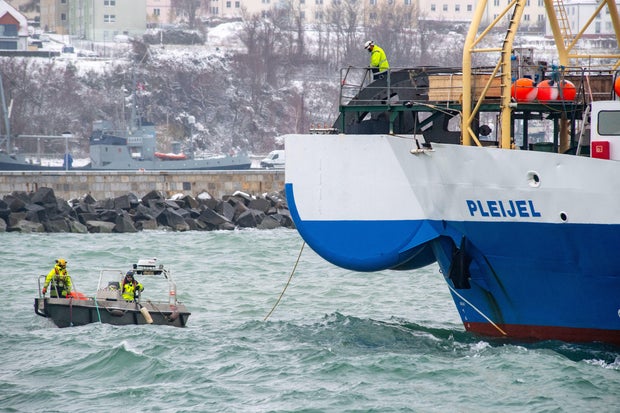Undersea cables cut or damaged, leading European nations to investigate possible sabotage
Two undersea cables carrying internet data deep in the Baltic Sea were damaged, European telecommunications companies said this week, drawing warnings from European governments of possible Russian "hybrid warfare" targeting global communications infrastructure.
On Wednesday, interest was focused on a Chinese-flagged cargo ship called the Yi Peng 3, which data provided by the maritime tracking service Vessel Finder showed to have been in the area around the time the cables were damaged.
The Yi Peng was anchored Wednesday in Danish waters, and Denmark's military confirmed in a brief statement posted online that it had a presence near the vessel, offering no further information. Vessel Finder tracking data showed a Danish navy patrol ship close to the anchored cargo vessel.
According to data from Vessel Finder, the bulk carrier, owned by Chinese firm Ningbo Yipeng Shipping Co. Ltd, departing from the remote northwest Russian port of Ust-Luga on Nov. 15, with a scheduled Dec. 3 arrival at Egypt's Port Said.
Speaking to reporters Wednesday in Moscow, Kremlin spokesman Dmitry Peskov denied any Russian involvement in the cables being damaged, calling it "quite absurd to continue to blame Russia for everything without any grounds." Peskov suggested Ukraine could have been behind sabotaging the cables.
The Finnish company Cinia confirmed that its submarine cable between Finland and Germany was damaged in the early hours of Monday morning. The cable is about 730 miles long and connects telecommunications networks in central Europe to Finland and other Nordic countries.
"The details of the fault are yet not known and are currently being investigated," the company said in a statement on its website.
The foreign ministers of Finland and Germany said in a joint statement Monday that a cable connecting the two countries had been cut and that the incidents had raised suspicion of possible sabotage.
"A thorough investigation is underway. Our European security is not only under threat from Russia's war of aggression against Ukraine, but also from hybrid warfare by malicious actors," the ministers said, without blaming any particular entity for the possible sabotage.
Swedish company Arelion confirmed to CBS News on Tuesday that one of its cables had also been damaged, on Sunday morning.
"We can confirm that one of our subsea fiber cables — the one between Gotland, Sweden and Šventoji, Lithuania — is damaged. The issue was detected on November 17, and we currently do not know what caused it as we have not been able to examine the cable," Arelion spokesperson Martin Sjögren told CBS News.
"Arelion is in contact with Swedish authorities and the Swedish Armed Forces regarding the incident. The cable will be repaired over the next few weeks depending on weather conditions," he said.
The Swedish Prosecutor's office confirmed to CBS News Wednesday that there was an ongoing investigation into "sabotage in the Baltic sea." In a separate statement, Sweden's national police force confirmed it was, "also interested in a ship seen at the locations in question. It [the ship] is not currently in Swedish waters."
"If I had a nickel for every time a Chinese ship was dragging its anchor on the bottom of the Baltic Sea in the vicinity of important cables I would have two nickels, which isn't much, but it's weird that it happened twice," Lithuanian Foreign Minister Gabrielius Landsbergis said in a statement posted on social media.
Audrius Stasiulaitis, a spokesperson for the Swedish multinational telecom company Telia, which uses and operates the Arelion cable, said Tuesday that the company believed the cable had been physically damaged.
"We can only speculate on what has happened, but as far as we see, it is not affected by equipment failure and we presume it's physical damage," he told CBS News over the phone.
The damage to the cables comes after reports over the past year that Russia may be targeting key infrastructure connecting Nordic countries.
An April 2023 joint investigation by the public broadcasters of Sweden, Denmark, Norway and Finland found that Moscow was operating a fleet of suspected intelligence vessels in Nordic waters as part of a Kremlin campaign potentially aimed at targeting underwater cables and wind farms.
There have been attacks on European infrastructure since Russia launched its full-scale invasion of Ukraine 1,000 days ago.
In September 2022, the Nord Stream 1 and Nord Stream 2 pipelines, both designed to carry natural gas from Russia to Germany under the Baltic Sea, were damaged by explosions.
Both Ukraine and Russia denied any involvement in the explosions. In August, German media reported that prosecutors had issued an arrest warrant for a Ukrainian man over the pipeline attacks.
Sweden and Finland have both joined the NATO military alliance over the past two years, as the war in Ukraine fuels concern about Russia's possible intentions, and just this week, both countries updated their war preparation guidance and published online booklets for citizens to prepare for the eventuality of a war or other crisis.




